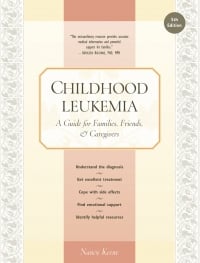Childhood Leukemia
Telling the Siblings
The diagnosis of cancer is traumatic for siblings. Family life is disrupted, their time with parents decreases, and the ill child receives a lot of attention. Older children and teens who understand the seriousness of a cancer diagnosis will be worried and fearful, but may hesitate to burden their parents with their concerns. Brothers and sisters need as much knowledge about what is going on as their sick sibling does. Information provided should be age appropriate, and all questions should be answered honestly.
Healthcare providers (e.g., physicians, physician assistants, nurse practitioners, child life specialists, and social workers) can help parents educate the siblings. Brothers and sisters can be extremely cooperative if they understand the changes that will occur in the family, and their role in helping the family cope. Maintaining open communication and respecting their feelings helps siblings feel loved and secure.
We always, always explained everything that was happening to Brian’s older brother (8 years old). He never asked questions, but always listened intently. He would say, “Okay. I understand. Everything’s all right.” We tried to get him to talk about it, but through all these years, he just never has. So we just kept explaining things at a level that he could understand, and he has done very well through the whole ordeal. The times that he seemed sad, we would take him out of school and let him stay at the Ronald McDonald House with his brother and one parent (we alternated parents—one at the Ronald McDonald House and one at home) for a few days, and that seemed to help him.
• • • • •
We have tried to spend one-on-one time with each of the other kids. These are some other things that have been good for us:
- The kids have been going to the hospital with Ethan one at a time, and getting a sense that this is no picnic, what he is going through.
- If one of us is out of town and Ethan is in the hospital, I have hired a babysitter to be with him in the evening and have done something special with the other kids for one of the nights. This works great if you live close enough to the hospital where your child is being treated.
- My husband and I have each taken the older kids on the traditional summer trips. This has been hard on Ethan, but none of this is perfect.
- My husband and I have each taken one school subject for the kids and have really spent time with them on it. I did reading with Tucker (I read everything he does and we talk about it), French with Abe, and Spanish with Jake. My husband has different topics, and we do something every day. We were too dysfunctional to be able to do more than one subject, so we decided to focus, and it has been a lot of fun for us.
We talk about lots of things as a family and help the kids as needed, but these are “special” things. This has been a long year for us, but I think these things helped.
Even with good communication and support, parents may see siblings struggling with tough emotions that may lead to behavioral changes, such as regression, school problems, and trouble sleeping. Chapter 17, Siblings, explores sibling issues in detail and includes many suggestions from both parents and siblings who have gone through this experience.
Table of Contents
All Guides- Introduction
- 1. Diagnosis
- 2. Overview of Childhood Leukemia
- 3. Acute Lymphoblastic Leukemia
- 4. Acute Myeloid Leukemia
- 5. Juvenile Myelomonocytic Leukemia
- 6. Chronic Myelogenous Leukemia
- 7. Telling Your Child and Others
- 8. Choosing a Treatment
- 9. Coping with Procedures
- 10. Forming a Partnership with the Medical Team
- 11. Hospitalization
- 12. Central Venous Catheters
- 13. Chemotherapy and Other Medications
- 14. Common Side Effects of Treatment
- 15. Radiation Therapy
- 16. Stem Cell Transplantation
- 17. Siblings
- 18. Family and Friends
- 19. Communication and Behavior
- 20. School
- 21. Sources of Support
- 22. Nutrition
- 23. Insurance, Record-keeping, and Financial Assistance
- 24. End of Treatment and Beyond
- 25. Relapse
- 26. Death and Bereavement
- Appendix A. Blood Tests and What They Mean
- Appendix B. Resource Organizations
- Appendix C. Books, Websites, and Support Groups

